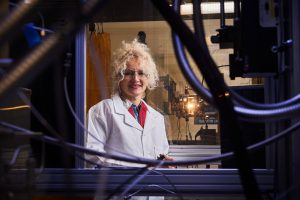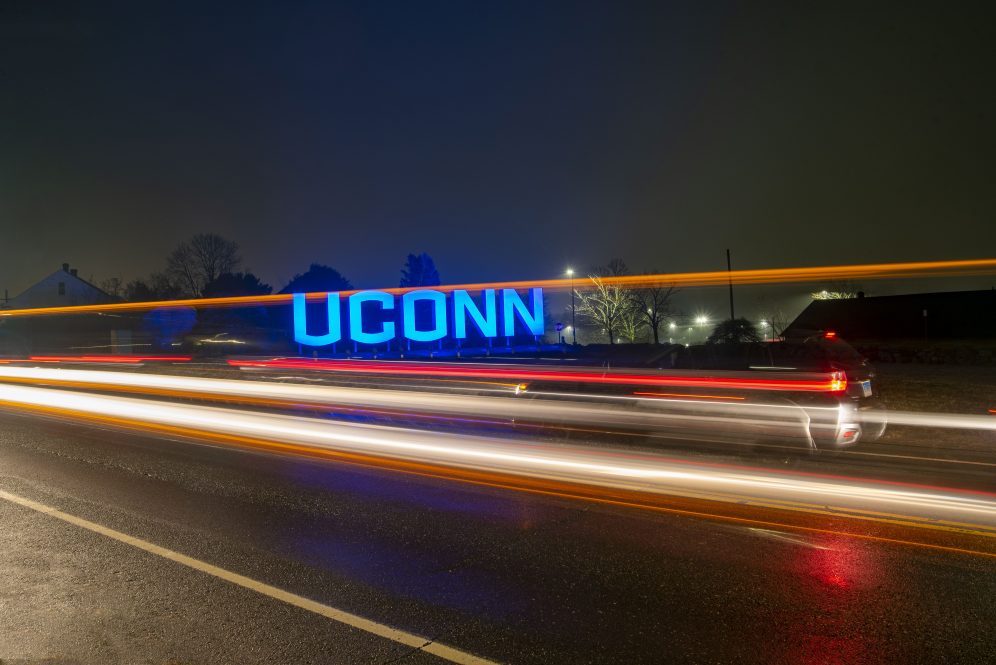The value of UConn’s research in driving economic development and transforming lives was highlighted Friday in an event led by the National Science Foundation, which supports many of the University’s most critical projects through significant grant funding.
Radenka Maric, UConn’s vice president for research, innovation, and entrepreneurship, was an invited participant in an experts’ roundtable at Yale University to discuss ways in which NSF supports innovation in Connecticut and strategies to leverage universities’ research for economic development.
The event comes as UConn is reaching records in grant funding and making its mark in entrepreneurship and innovation, both through new discoveries among its own researchers and through its support of startups at its incubators at Storrs, Stamford, and UConn Health.
“UConn has made significant strides in becoming a powerhouse in research,” Maric said, adding that investments in its faculty and students have created what she calls an “entrepreneurial ecosystem” at Storrs, UConn Health, and the University’s regional campuses.

UConn’s research enterprise has grown consistently over the last several years as measured by many metrics, including garnering a record-setting $375 million in sponsored-program grant awards in the most recent fiscal year.
Support from the NSF was a critical part of that total, including a $40 million grant – the University’s highest yet – to advance molecular research nationally for chemistry, materials science, and bioscience.
Among the 26 federal grant-making agencies, the NSF is consistently one of the top funders of UConn research each year along with the National Institutes of Health. The projects that the NSF supports at UConn span multiple disciplines, including some that Maric described during Friday’s panel discussion as she invited NSF Director Sethuraman Panchanathan to visit UConn’s campuses to see the work in action.
Maric and Panchanathan were joined at the forum Friday along with roundtable leader U.S. Sen. Richard Blumenthal and representatives from Yale, the City of New Haven, and private industry. U.S. Sen. Chris Murphy also welcomed and thanked the participants remotely via a recorded video and UConn Interim President Dr. Andrew Agwunobi, CEO of UConn Health, followed the discussion via its webcast.
Maric made a particularly well-received point to emphasize that research for the sake of knowledge, while interesting, can be most impactful when universities and other agencies intentionally spread the word to help people understand how those innovations improve their lives and that of their families and friends.
“Science goes into communities. It helps us as a society, and this is the message we have to all bring to the street and to the public, and to say in simple language,” Maric said.
Panchanathan, Blumenthal, and the other participants praised Maric’s point, with Blumenthal saying he and others want the world to know what UConn and Yale are accomplishing and how it makes a difference in the lives of everyday people.
“They should know how exciting and important this curiosity-driven research is in developing cures and treatments, and equally importantly in prevention,” Blumenthal said.
In his recorded greetings, Sen. Murphy also emphasized the role that Connecticut-based educational institutions and others play in economic development and innovation, and the state’s gratitude for the NSF’s investments in its researchers’ brainpower.
“We know the economic salvation of this nation and indeed the economic salvation of our state of Connecticut runs through the development of a science- and technology-based economy,” he said.
Economic development is one of UConn’s core research principles, which include many initiatives to support existing industries and create new fields with licenses, patents, and technology transfer.
UConn’s core research priorities also complement national topics of importance such as genomics and neuroscience, climate studies, cybersecurity, energy, personalized medicine, cancer detection and care, manufacturing innovations, and other areas.
Panchanathan was particularly complimentary of UConn’s dedication to emerging fields in climate and green studies and medical areas, saying those are likely to be “blockbusters” in terms of innovation and that UConn is smart to create its niche of expertise in those areas.
UConn has more than 2,000 active researchers across its campuses and partners with about 150 institutions worldwide, according to information compiled by OVPR. It is also one of only three U.S. members of the Universitas 21 network, the leading global network of research universities for the 21st century.
It also is excelling in other ways both institutionally and in terms of the achievements of individual researchers and teams, with multiple researchers selected under the National Science Foundation Faculty Early Career Development Program.
UConn and UConn Health also consistently have multiple faculty members named annually to the Highly Cited Researchers List, a summary of scientists and social scientists who produced papers ranking in the top 1% by citations for their field and year of publication, demonstrating significant research influence among their peers.



